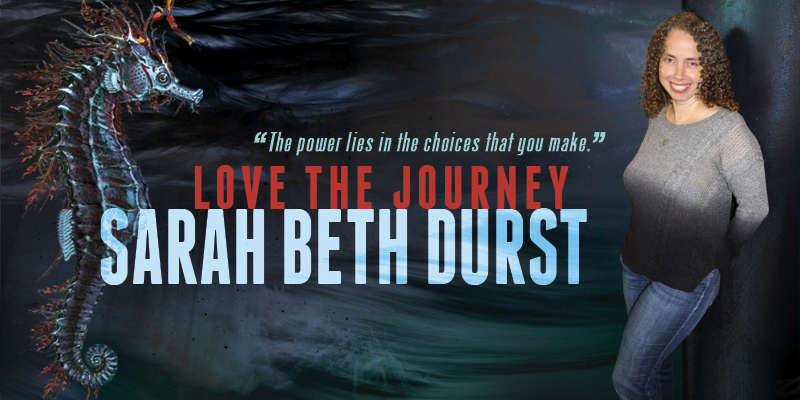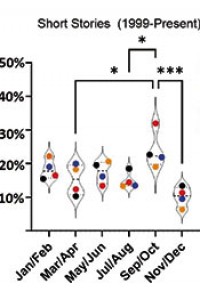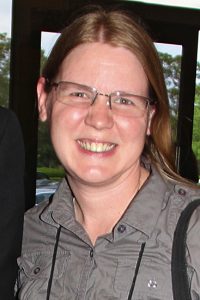Sarah Beth Durst: Love the Journey

Sarah Beth Durst was born Sarah Beth Angelini on May 23, 1974, in Northboro MA. She attended Princeton University, graduating in 1996 with a degree in English with a concentration in theater and dance. She lived in England with her husband-to-be for a year, then returned to Massachusetts, and eventually settled in Stony Brook NY.
Durst writes fantasy for adults, young adults, and children. Her debut novel, middle-grade Into the Wild (2007), was nominated for an Andre Norton Award, and was followed by sequel Out of the Wild (2008). Other middle-grade books include Mythopoeic Award finalist The Girl Who Could Not Dream (2015), Journey Across the Hidden Islands (2017), and The Stone Girl’s Story (2018). Standalone middle-grade novel Spark is forthcoming.
YA novels include Andre Norton Award nominee Ice (2009); Enchanted Ivy (2010); Drink, Slay, Love (2011), adapted as a TV movie in 2017; Mythopoeic Award winner and Andre Norton Award nominee Vessel (2012); Mythopoeic Award finalist Conjured (2013); Chasing Power (2014); and Fire & Heist (2018).
Her Queens of Renthia adult epic fantasy trilogy is ALA Alex Award winner The Queen of Blood (2016), The Reluctant Queen (2017), and The Queen of Sorrow (2018). Spin-off Tales of Renthia standalone is The Deepest Blue (2019). Adult epic fantasy Race the Sands, set in a new world, is forthcoming.
She lives with her husband Adam Durst and their two children.
Excerpts from the interview:
“I grew up in Massachusetts – and Narnia, and Pern. I’ve always believed that books are magic. They’re these little rectangles with the power to transport you and take you on an adventure, and bring you back completely changed. Maybe a little stronger, a little more magical, or a little braver, and I always wanted to be a part of that magic. It wasn’t until I was ten years old that I decided to become a writer. Before that, the only thing I wanted to be was Wonder Woman, and that didn’t work out.
“Before I was ten, I always thought of writers as mythical. Or dead. It hadn’t occurred to me that an ordinary person could become a writer. I’d never met anybody who was a writer. I have this clear memory of reading Alanna by Tamora Pierce when I was ten years old, about a girl who wants to become a knight in a land where only boys can do that. I remember closing that book and thinking to myself, ‘If Alanna can become a knight, I can become a writer.’ That’s where it started.
“I have told Tamora Pierce that; she definitely didn’t like the part where I said I was ten years old. I actually met her at Boskone, a Boston-based SF convention, before I was published. She read one of my early manuscripts, which later became Ice, and has been so supportive and wonderful. It’s great when you meet your heroes and they turn out to be just as heroic and wonderful as you always hoped they’d be.
“I dove right into the writing part. I wrote my first story in school in fifth grade – my teacher very nicely let me keep writing in class. It was a cross between The Wizard of Oz and G.I. Joe, with a lot of talking lions. That was the first thing that I wrote, but I didn’t finish it. I kept writing stories I didn’t finish, all through middle school and high school. In college I took a lot of playwriting courses because I had all these great avant-garde playwriting instructors that let me say things like, ‘And now a dragon lands on the stage!’ After college I returned to writing novels.
“I lived in England for a year after college with the man who become my husband. He had a Churchill scholarship, and he said, ‘Do you want to come?’ I said, ‘Yes, I absolutely want to come!’ I worked in a library for about six months until my student work permit ran out and, since I couldn’t work, I made it my goal to finish a novel, and I did. I just wrote and tried to visit as many castles as I could. It was one of those turning point years, when I said, ‘This is what I want my future to be,’ and just tried to chase after it. The novel I wrote during that time is not one that’s published, but it was fantasy. I’ve only ever wanted to write fantasy. As a kid I spent my childhood in the woods behind my house searching for dragons. On rainy days, I would check every closet in my house looking for the way into Narnia. If somebody opens a closet in a book that I’m reading, I expect it to be a transdimensional portal with talking rabbits. If it’s just clothes, I’m totally disappointed.
“I had no hesitation about writing the next novel. I actually don’t like finishing novels. It’s sad to say goodbye to the characters, because you live in their world for so long and you create these friends – and have horrible things happen to them – and then you have to leave them. I don’t like that, so I always try to know what I’m going to write next. If I finish a novel in the morning, I start the next one that afternoon. I need to be writing. Writing is what makes the world feel balanced to me.
“I don’t believe in waiting for inspiration. I believe in sitting down at the desk with a computer. You do that every day. If the muse wants to come along and sit down next to you, great! If it doesn’t, you just keep writing.
“I read to go on adventures and to feel heightened emotions. Fantasy is a literature of hope and empowerment. That’s what draws me to it. I love the feeling when you read a fantasy novel and you close it and the world is more full of wonder than it was before, and you’re stronger. I love those themes of ‘little guy conquers massive evil,’ and ‘love and friendship triumph at the end!’ I don’t write all sunshine and roses, though. My epic fantasy, The Queen of Blood, the first book in the Queens of Renthia trilogy, is called The Queen of Blood for good reason, but there’s a core of hope in it. That’s what draws me to fantasy. It’s the ideal genre for expressing the perseverance of the human spirit. It’s the extreme sport of empathy.”
Interview design by Francesca Myman. Photo by Liza Groen Trombi.
Read the full interview in the April 2019 issue of Locus.
 While you are here, please take a moment to support Locus with a one-time or recurring donation. We rely on reader donations to keep the magazine and site going, and would like to keep the site paywall free, but WE NEED YOUR FINANCIAL SUPPORT to continue quality coverage of the science fiction and fantasy field.
While you are here, please take a moment to support Locus with a one-time or recurring donation. We rely on reader donations to keep the magazine and site going, and would like to keep the site paywall free, but WE NEED YOUR FINANCIAL SUPPORT to continue quality coverage of the science fiction and fantasy field.






